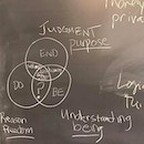Blockquote

Ichthus77 (formerly She™)Ichthus77Regular
3h
“What if there is only one time/recollection, but all the revisions are included a priori?
Withdrawn, your honor. Stricken from the record. Jury, make your decision as if you never heard that.“
Objection .
It has not been established that a review of the record indicate a prior distinction between heresay(recall) and and the recalled testimony.
(in a possible appeal and possible plea deal, the identifiable omitted facts in the case may be shifted to a trial by judge, so as to avoid opinionated statements to function in a pro-scripted manner.)
.
The Devil, Daniel Webster, and the Heroic Advocate Trope
In the Halloween spirit, this blogpost is going to focus on Stephen Vincent Benét’s classic 1936 tale “The Devil and Daniel Webster”- a little story that tells of how an American legal legend beat the Devil himself in a trial for a man’s soul.
For context, Webster died in 1852, so–unless you’re from New England, or a scholar of American history–his name may not be immediately recognizable. But he was a respected courtroom litigator in his time, and when Stephen Vincent Benét sat down to write a story about an American lawyer taking the Devil to court, Webster became his proxy to fill that role.
Stories about deals with the Devil go back centuries (the legend of Faust comes to mind) and continue into modern times, for instance on shows like The Twilight Zone, and in songs such as “The Devil Went Down to Georgia”, presumably because this trope has struck a chord for many readers and media-consumers. This simple tale has become well-known in pop culture as seen for instance in The Simpsons’ Halloween special “Treehouse of Horror IV” (segment “The Devil and Homer Simpson”), and more recently on Netflix’s The Chilling Adventures of Sabrina.
Sometimes, the Devil gets the soul; sometimes, he’s outsmarted…. But Benét’s story may be the first to subject the Prince of Darkness to the venue of American jurisprudence.
The story kicks off with farmer Jabez Stone making a hasty deal with a stranger who announces himself as ‘Mr. Scratch’, and promises the man seven years of good luck and prosperity in exchange for his soul. When Stone tries to bargain for an extension, the Devil gives him the typical retort of ‘You have until midnight!’.
At which point, he runs to retain the services of Daniel Webster.
Webster begins his negotiation by saying that “Mr. Stone is an American citizen, and no American citizen may be forced into the service of a foreign prince.”, but the Devil points out that he’s been in America since before the colonial era and persists (“Am I not spoken of, still, in every church in New England?”) as a vital character in the American milieu.
So Webster demands a trial, with an American judge and jury. The Devil chooses (of course) twelve notoriously evil Americans to serve on the jury, including the pirate Blackbeard; unfortunately, Benedict Arnold had a scheduling conflict. In any case, Benét makes the point that this trial is unfairly stacked against Webster.
However, the whole drama is based around Webster’s legendary eloquence. So although he faces the Devil himself, a heavily biased jury, and a judge who presided over the Salem witch trials, our brave Advocate Webster artfully proclaims that Jabez Stone is an American like any other man working to scratch out a living from this land. He argues that Jabez was taken advantage of by the Devil, but his soul is an essentially American soul and therefore presumably, a pure and innocent one.
In the end, Webster’s passionate oration about American freedoms is enough to sway the hearts of even this blackest-hearted jury, and they find in favor of the defendant.
The phrase ‘zealous advocate’ conjures up an image of a dedicated defender who will go to any lengths to defend their client. This story, when you get right down to it, is about a lawyer who’s ready to defy Hell and the Devil himself to win his case. And perhaps it doesn’t need to be any more complicated than that.
CLOSING ARGUMENT
A lawyer has two duties in representing their client: to serve as a “zealous advocate” and as a “wise counselor”; however, it has often seemed to me that both in law school and in our American culture, a stronger emphasis is placed on zealous advocacy. Perhaps it is simply easier to teach the rules of Court and how to employ them, than it is to teach “wisdom”.
Unlike more traditional lawyering, Consilium’s model requires lawyers to envision outcomes prior to choosing and engaging with a legal process, whether that process is litigation, mediation, arbitration, or collaborative law.
That having been said, Stephen Vincent Benét’s mission was taking on the devil! And this story is a powerful example of zealous advocacy at its best.
